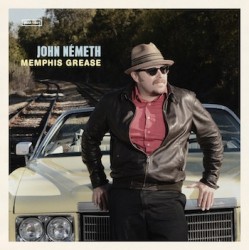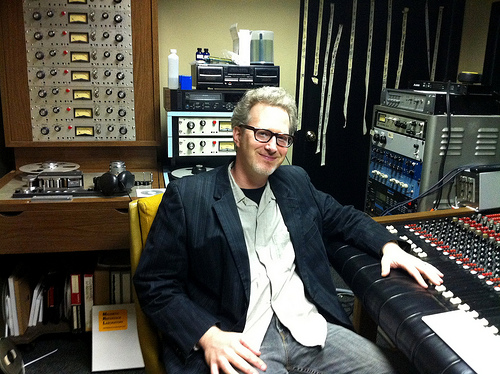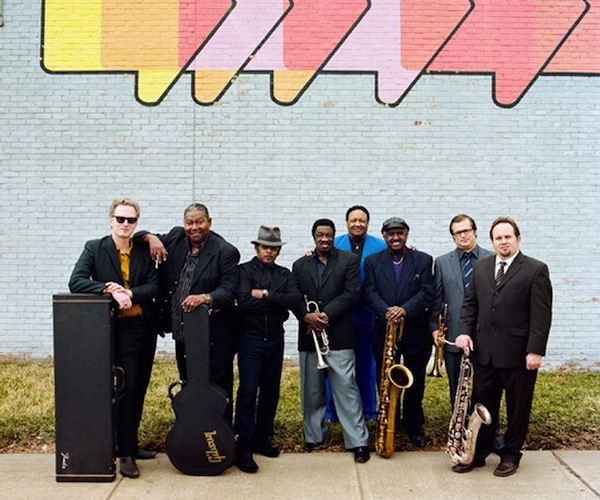Fuse Music Interview: The “Grease” guy –The Bo-Keys and John Nemeth bring the Memphis Sound to Town
Scott Bomar’s multi-generational band The Bo-Keys has almost single-handedly kept the soul tradition of the Stax and Hi labels alive.
By Noah Schaffer
There’s no job application for “the man with the Memphis feel,” but Scott Bomar has made a career out of it.
The lifelong Memphis bassist/engineer/producer/bandleader/studio owner has been a part of projects that have ranged from Al Green to Cyndi Lauper to scoring the Hustle & Flow soundtrack. His multi-generational band The Bo-Keys has almost single-handedly kept the soul tradition of the Stax and Hi labels alive.
Recently Bomar and The Bo-Keys, including legendary Hi drummer Howard Grimes, recorded the Memphis Grease LP with popular soul-blues purveyor John Nemeth. The album combines Nemeth’s smartly written originals with daring covers of Roy Orbison and Howard Tate songs, all delivered with passion and grit.
Nemeth and The Bo-Keys (with locally-raised drummer Danny Banks filling it for Grimes) wrap up a national tour this weekend with shows tonight at Johnny D’s in Somerville and Saturday at the Bull Run in Shirley, MA. The cast includes veteran Memphis greats vocalist Percy Wiggins and keyboardist Archie Turner (whose organ graced records by Green, O.V. Wright and Ann Peebles). Bomar recently took time out of his road duties to talk to the Arts Fuse.
Arts Fuse: You’ve been a producer/engineer/bandleader for a lot of legendary performers who were active when Stax and Hi were flourishing. Is the creative process difference when you’re working with an artist like Nemeth who, like you, is from a younger generation that wants to keep the Memphis soul sound alive? And what’s the difference between working with a soul-blues act like Nemeth and someone who is coming from the hip-hop or pop worlds?
Scott Bomar: John has really done his homework and knows his music. He has a great feel and fell right in to what we do.
Hip-hop and pop artists typically have all of their music and phrasing figured out before they record, and have tracks that are programmed and sequenced. Not to knock that process, but the way we make records is more spontaneous, and it changes based on the feeling of the musicians in the room.
AF: You’ll be bringing along Percy Wiggins and Archie Turner on this tour. Although a lot of soul fans know his brother Spencer, Percy is a hidden gem who has largely gained his audience through The Bo-Keys. Are there any challenges in having a multi-generational band?
Bomar: We are all on the same page musically and in every other way. The younger guys in the band all grew up listening, watching and learning from the wealth of older players in Memphis. Unfortunately, there are fewer and fewer of those older players around. It feels strange to say, but I feel that we are continuing the tradition. Howard brought Percy to the group. They had worked together in the Hi Rhythm Section. Percy was the vocalist they would take on the road to sing all of the hits they played on. Having Percy with The Bo-Keys has added a completely other dimension to the group. Before we would do our instrumentals and back various vocalists, but now we have a full time vocalist in the band and can work up original vocal songs.
AF: You’re equally at home on the studio and on stage. Obviously in the studio you’ve got your choice of gear. Is it tough recreating that sound on stage?
Bomar: I think the sound is in us, so as long as the sound people at the venues capture what we’re doing on stage it comes across. Sometimes playing in a different room every night on tour is a challenge, but the guys in the group are really experienced and we always figure it out.
AF: Last year Percy and The Bo-Keys cut a single for the 78 Project, and a film about that project is showing here in Boston later this month as part of the Independent Film Festival Boston. What was it like going all the way back to the original recorded music format?
Bomar: Recording on the Presto machine for the 78 Project was a real thrill. When we did the film Soul Men, Alex Styermark, who started the 78 Project, was the music supervisor so we go back a ways with him. I went out to Long Island with him when he bought the machine. We loved recording that way and we hope to do it again soon.
Over the past 15 years Noah Schaffer has written about otherwise unheralded musicians from the worlds of gospel, jazz, blues, Latin, African, reggae, Middle Eastern music, klezmer, polka and far beyond. He has won over ten awards from the New England Newspaper and Press Association.



